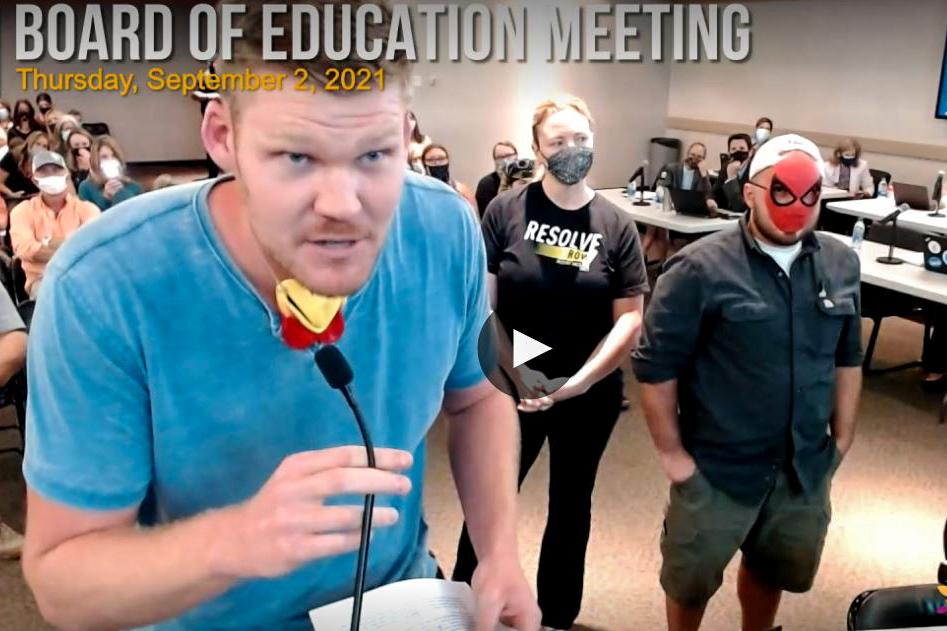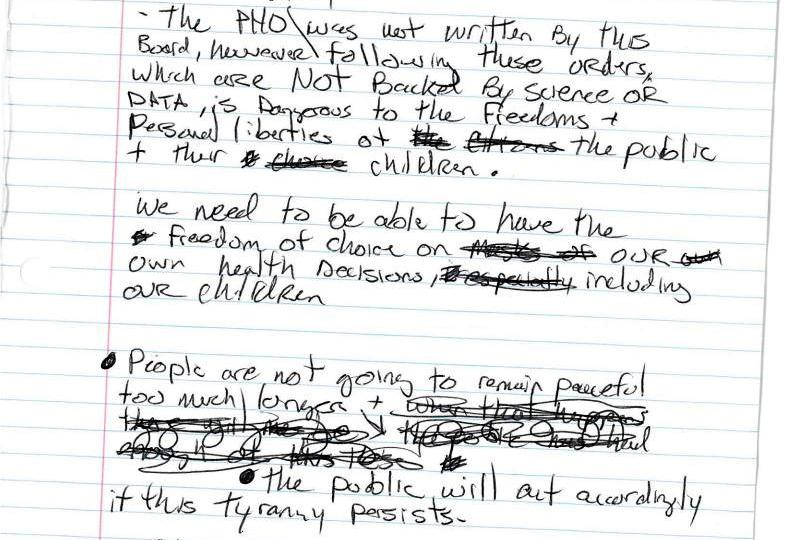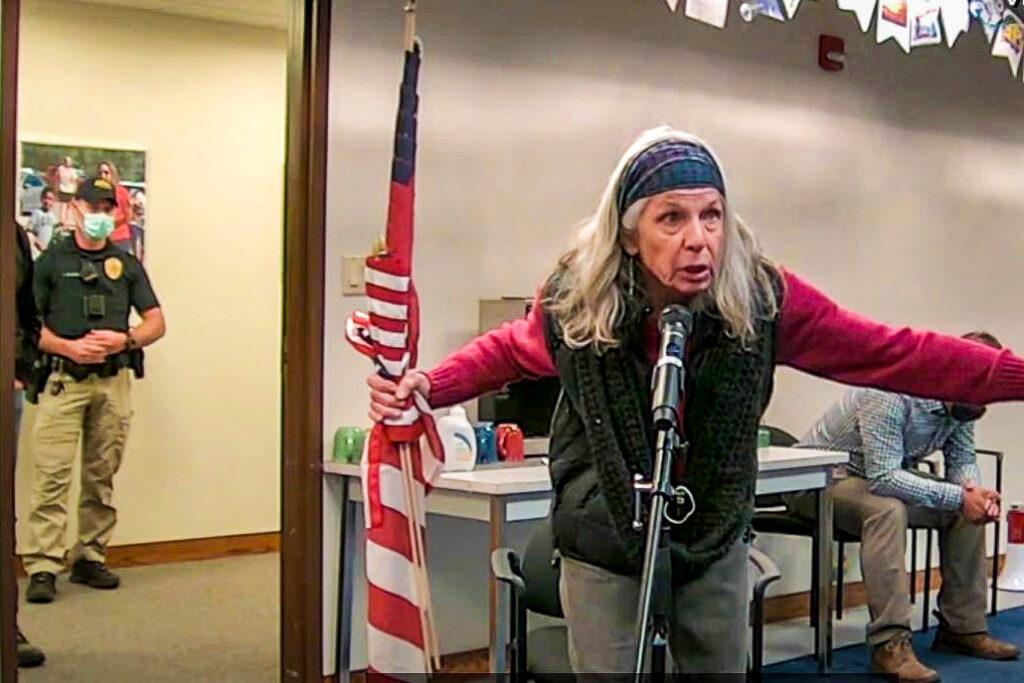
Editor's note: This story was published in October 2021. We're re-sharing it in light of recent events in Douglas County and Mesa County.
In the past in Colorado, this has been the well-oiled strategy for finding people to run for school board:
“Go out and beg people to run for the office,” said Bret Miles, executive director of the Colorado Association of School Executives.
And if the begging didn’t work, elections were canceled.
Those days are over. At least this year.
Colorado – like the rest of the nation — has seen a groundswell of people running for their local school boards. Typically, candidates have spent years volunteering on school accountability committees or parent-teacher organizations. It’s a job with a steep learning curve – strategic plans, complex budgets, agreements with employee groups, the nuances of federal aid programs. This year, however, there are a flood of newcomers, and many don’t have much school experience.
That’s despite a year of at times toxic school board meetings where board members across the state have been called Nazis and child abusers.
“This feels incredibly different in that it's really about a larger, national political ideology rather than what we have seen throughout my career,” Miles said. “This is very different from anything that I've observed.”
Several national hot-button issues like mask-wearing and the teaching — or not — of critical race theory in schools have pushed angry parents to try to “take back” their school boards. That’s drawn high emotions, endorsements and campaign money from new sources like political parties and parent Facebook groups.

The scene at school board meetings the past year laid the groundwork for the upcoming school board elections.
The coronavirus and public health orders keeping children in remote learning or wearing masks outraged some parents. As their children struggled with online learning at home, some parents turned their anxiety and fear against school board members. In some districts, it was a vocal minority. In others, the furor was more widespread.
“Our children should not be subjected to these invasive tests,” said Susan Miller Youll, a Lakewood parent, at a September Jefferson County school board meeting on the topic of COVID testing for unvaccinated students. “We tell our girls every day, ‘Your body belongs to you, no one should ever put your hands on you.’ Do I tell her — ‘Except when the government wants to?’”
Some community members, school board members say, have crossed the line.
“I’ve never been called a Nazi in my life, but I can’t tell you how many times (this past year) … or a child abuser, or contributing to rape culture because of the masks,” said JeffCo school board member Stephanie Schooley. “It just tears you down a little.”
At the JeffCo September school board meeting, facing an audience of masking opponents, Schooley recounted how her children became frightened after strangers took pictures of them outside their house, how unsettling it was to get threatening letters. Schooley said later she was trying to appeal to the audience as a neighbor, as someone with a child in their children’s schools.
Then someone in the audience shouted out that board members' lives weren’t more important than their children, among other comments. The board took a five-minute recess, members clearly shaken. Schooley stopped using social media, previously her platform for sharing ideas, about a year ago — the vitriol she was facing there was too much. In some districts, angry outbursts and other disruptions sometimes required security to escort members of the public out of the meeting.
As Schooley listened to stories from other district board members at a Colorado Association of School Boards meeting, she noticed, “there’s a bit of trauma with being a school board member.”
“It sounds like the most ridiculous sentence ever said but for our colleagues in Weld County, or in Boulder Valley, Douglas County, Cherry Creek, Denver … everyone had similar stories about significant barriers to actually being able to get work done.”
In other districts, like Cherry Creek, new equity policies and attempts to make the curriculum more inclusive of minority students drew angry parents, suspicious that schools were teaching “critical race theory,” a legal theory that includes the idea that racism is embedded in the country’s laws and institutions.
Most speakers at those meetings, however, applauded the district’s efforts to revise the social studies curriculum to include the contributions of people of color and the LGBTQ community. But the division makes for tense school board meetings.
At a June meeting, about a dozen men and women in military-style dress, some with the United American Defense Force logo, were present. The organization’s tag line is “Defending What’s Ours,” and the group said they partner with the conservative group FEC United, which is currently embroiled in a lawsuit about conspiracy theories and the 2020 election.

Some parents and conservative and religious groups turn their furor towards the elections.
In a Facebook post, FEC United endorsed Douglas County School district candidate Christy Williams and Cherry Creek School board candidate Jennifer Gibbons. At a candidate forum, Gibbons responded to a question about that endorsement, stating she didn’t know what that group was, but added:
“I’m glad that my message is reaching other people and I’m happy for their support, I hope they vote for me.”
Gibbons is locked in a tight race with incumbent board member Kelly Bates. Anti-mask activist Schumé Navarro is also in that race.
Conservative political action groups, sometimes with religious affiliations, like “Stand for the Constitution” in Grand Junction, are also weighing in on races. The 1776 Project PAC is backing a slate of candidates in Douglas County, District 51 in Grand Junction, and Academy 20 and Falcon 49 in El Paso County. The group is dedicated to electing school board members willing to promote “patriotism and pride in American history,” and says it opposes “critical race theory.”
Another group, Colorado’s MAD says parents must “fix the damage self-interested, corrupt politicians, who are owned by special interests, inflicted on our children.” It takes a more pointed stand against teacher’s unions, which are large campaign donors in many races. The group is backing candidates in the Aurora, Thompson, and Poudre districts.
The parent group Guardians of RE-4 in Weld County, which has 1,400 members on its Facebook site, is dedicated to the success of students “while focusing on protecting our rights” and defending the U.S. constitution. A competing community group, Unite RE-4, calls for voting for incumbent board members to preserve continuity, competency and cooperation” on the school board.
Traditional issues still dominate many candidate forums.
District budget priorities, school choice, closing the achievement gap, career and technical education, and student and teacher mental health are still the issues that dominate most debates. A recent forum in the Boulder school district focused on Latino student achievement, gun violence, and substitute and teacher pay.
Some questions shine a light on deeper differences between candidates, such as whether teachers should be armed in school, as well as on issues like pay for performance — a pay model that incorporates measures like student test scores into teachers’ salaries.
“There are multiple states that do it effectively,” JeffCo candidate David Johnson said of performance-based pay at a recent forum. “It’s in every single industry on the planet, except education, there has to be a way to tie pay to performance to compensation.”
On the other side, candidate Paula Reed, a former teacher, remembers the tumult she believes that the pay model ushered in when it was instituted by a school board majority that was later recalled in a special election.
“What it did is it made teachers angry and resentful of each other,” she said, adding that before teachers shared their best ideas with each other. “You weren’t competing against each other.”

Slates of candidates are making races more high-stakes and more contentious.
In Colorado, several races – including Douglas County, Jefferson County and Mesa County Valley School District 51 — have “slates” of conservative-leaning candidates aimed at taking over. They’re unhappy with how their school boards handled the unprecedented pandemic turmoil.
This year, the slate set on forming a new board majority in Douglas County, Kids First, says they want to bring parents into the forefront of school decisions, restore trust in the school board, and keep “indoctrination” out of the classroom. Candidates support a tax hike to pay teachers more, are opposed to vouchers and want parents to choose whether to mask or vaccinate their children.
The other Douglas County slate, Community Matters, which includes two incumbents, says it wants to keep the momentum of the past four years going, pointing to strong academic achievement, stemming the flow of teachers that were leaving the district under a previous board majority, and prioritizing student mental health in every school.
Sharp differences between the two slates have emerged in forums. On a question about what policies they’d push to prevent violence in schools, Kids First candidate Mike Peterson suggested, alongside continued partnership with law enforcement, partnering with community groups like Able Sheppard — a Centennial based company that offers armed and unarmed active shooter response training — as well as Bible studies — to groups.
“We have experts here that are not part of the system that provide great advice,” he said.
Community Matters candidate and incumbent board member Krista Holtzmann supports certified law enforcement and school security carrying firearms in schools.
“But I will continue to advocate that there should not be other people carrying firearms in our schools.”
Claims of marxism, tyranny and CRT.
In other districts, questions about COVID policies, masks and “critical race theory” or “CRT” and “DEI” (diversity, equity and inclusion) are more common. Two strong themes among some candidates in several debates reviewed by CPR is the notion that parents' voices are not being heard and deep suspicion about what is taught in schools.
In a recent candidate forum in Academy School District 20 in El Paso County, multiple candidates referred to alleged “indoctrination” and “social engineering” of students.
One candidate said the district’s efforts at “diversity, equity, and inclusion” are “at its core level, Marxism.” A second referred to “stopping tyranny and abuse on our children,” and said one of her goals was “to take back our country.”
A third stated, “Trying to infiltrate CRT with flowery words of DEI is not the way to do it. If you’ve read the ‘Naked Communist,’ you know exactly what this is. It’s designed to divide people so that they can bring about a socialist society.”

Political parties are weighing in on school races – sometimes with money.
Traditionally, school board races are nonpartisan and political parties steer clear.
The Mesa County Republican Party has donated $3,000 to a candidate from the slate it backs. Party Chair Kevin McCarney said teachers’ unions, which he described as “left-leaning organizations,” provide thousands of dollars to some candidates, while the other candidates are left to fend for themselves.
“It’s not like we were the first ones to break the nonpartisan covenant. In all honesty, there’s no such thing as a nonpartisan race. There’s always partisan issues in those races, and to be silent is to cede ground that we can’t cede anymore.”
The Teller County Republican Party has donated money to each of the four ‘conservative’ candidates running in the Woodland Park School District race. That slate of candidates openly tells voters on billboards to “vote conservative.”
In Douglas County, the Republican Party has also endorsed a slate of candidates, as has the Larimer County Republican Party. The Colorado Democratic Party chair’s weekly newsletter has endorsed candidates in several districts. The El Paso County Democratic Party also posts endorsements for several districts.
Political party monetary contributions are a troublesome trend to some.
“That is relatively new and definitely politicizes the races in a way that the original intention was to avoid,” said Paul Teske, dean of the School of Public Affairs at CU Denver. “It’s a concern. It’s definitely a change.”
Teske said he hopes the highly politicized volatility won’t last forever and “we get back to something more focused on how to teach math in third grade or how to hire the right superintendents.”

Given the intimidation, threats and more, will people with experience in schools continue to run for school board?
The uncivil behavior, threats, attacks, intimidation and threats to board members’ children, has become too much for some. Paul Pitton, who resigned recently as vice-chair from Mesa County Valley 51’s board, said in his resignation letter, “Politics have crept in and have no place in the public school system.”
A board member in the Garfield RE-2 School District also resigned last week. In her resignation speech, Katie Mackley said she could no longer do the work of cultivating innovation and achievement in the district.
“Unfortunately, the important and real work of the Garfield RE-2 School Board continues to be upended by community members who choose to place personal politics and social media notoriety above the education of students in this district,” she said. “This is not the community I grew up in.”
The district recently instituted a mask mandate because of high quarantine levels among students. Mackley said board members have been maligned on social media, screamed at, and stalked in public. One of her children has become the victim of retaliation.
“I never could have imagined that these things were possible,” she said. “Especially over a piece of cloth.”
Recall petitions for board members are also up this year. There was an attempt in Douglas County this spring, and board members in Boulder Valley and Weld RE-4 districts face recall petitions over mask policies and other items.
“At a board level we’re still doing the work as if there was no recall, but on a personal level … the inflammatory nature of it, the name-calling, the mean-spiritedness, it’s hard,” said Boulder Valley School District board member Kathy Gebhardt.
- Douglas County schools to close Thursday as teachers call ‘sick out’ to protest school board majority
- Douglas County students walk out of class Monday in protest of school board
- Mesa County Valley School Board will meet in a closed session to review contracts for current and future superintendent
- Some predicted conservatives would sweep Colorado school board races this year. The election results are more complicated
- Education officials are closer to having a new plan (and money) to serve Colorado families with young children
- Colorado students aren’t supposed to graduate without learning about Indigenous history and culture. Are they?
- Valor Christian allegedly pushed out two gay teachers and is facing calls for change. Now it’s being honored as a top school nationally
“People are claiming we're not listening, but people conflate listening with agreeing,” she said. “I listen to all of this but that doesn’t mean I agree and doesn’t mean I’m not listening.”
Jefferson County school board member Stephanie Schooley, who is not up for re-election, said while the last few months have been extraordinarily difficult, she still feels honored to be a school board member. She said she’ll continue to try to make herself accessible and to listen and make people feel heard.
“That commitment is unwavering. It’s just more nuanced now.”
She points to a silver lining after a turbulent year. More people may pay attention to the down-ballot candidates now.
“For better or worse, people are paying attention in a very different way on all sides of the spectrum in terms of ideology and issues, and that is something I’d never want to go in the opposite direction.”
Correction: At a June meeting of the Cherry Creek School District Board of Education, about a dozen men and women who wore military-style dress were unarmed. Because of incorrect accounts provided to CPR News, a previous version of this story incorrectly identified them as armed.









